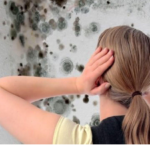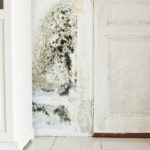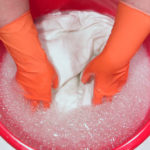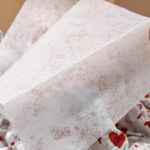1. Tips for dealing with mold on walls and ceilings
Mold often appears when there is high humidity and lack of ventilation in the house. This not only affects the aesthetic value but also poses serious health risks such as asthma, allergies, and infections. Therefore, it is important to remove mold.
If your walls and ceilings have mold, here are some solutions to help keep your living space clean and safe.
Citric Acid Solution
Citric acid, often found in fruits such as lemons and oranges, is a natural substance that can effectively clean and eliminate mold. You can purchase pure citric acid at many grocery stores or supermarkets. It is used as a natural preservative or to add a sour taste to certain packaged foods.
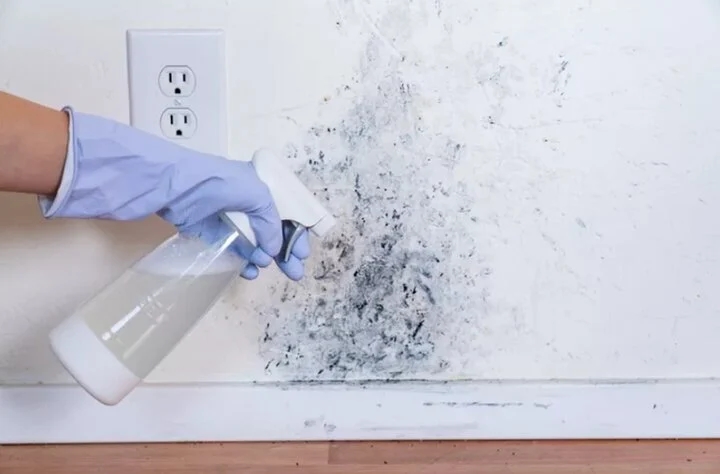
Walls and ceilings with mold, use this water to clean (Image: The Spruce)
To treat mold on walls and ceilings, mix 1 liter of water with 1-2 tablespoons of citric acid, stir until dissolved, pour into a spray bottle, and evenly spray the solution on the affected areas.
Leave the solution to soak for about 10-15 minutes, then use a soft brush to gently scrub the moldy area and wipe clean with water. Allow the surface to dry completely naturally, then check carefully for any remaining mold; repeat the process if necessary.
To prevent mold from reoccurring, ensure good ventilation and stable humidity in your living space; regularly clean and check for any signs of new mold.
White Vinegar
When mold starts to appear on the walls, it is best to deal with it promptly, and white vinegar is considered an effective natural mold remover.
Combine equal parts of pure white vinegar and water, use a spray bottle to apply this mixture to the moldy areas, allow the mixture to dry completely, and wipe clean with water.
Water and Soap
Add a small amount of soap to warm water. When your walls and ceilings have mold, use this water to clean. For stubborn mold areas, you can use a little baking soda or white vinegar to enhance the cleaning effect.
Hydrogen Peroxide Solution
Hydrogen peroxide is a highly effective mold remover. Mix a small amount of hydrogen peroxide with warm water, then use this solution to clean.
Chlorine-Based Solution
If the mold problem is severe, you can use chlorine-based solutions such as bleach water to clean. However, you should be cautious as chlorine can cause skin irritation and respiratory issues.
Tea Tree Oil Solution
Tea tree oil has antibacterial and antifungal properties. Mix a few drops of tea tree oil with warm water. When your walls and ceilings have mold, use this water to clean thoroughly.
Tips for dealing with mold on walls and ceilings
Before starting, make sure you wear a mask, gloves, and safety goggles to protect yourself from inhaling mold spores and cleaning chemicals.
After cleaning the mold, ensure good ventilation by using a fan or a dehumidifier to help the walls and ceilings dry quickly. At the same time, investigate the root cause of the problem and take preventive measures to prevent mold reoccurrence.
Tips for preventing mold on walls and ceilings
To prevent mold from appearing on walls and ceilings, you can take the following preventive measures:
Control Humidity
High humidity is one of the primary factors that contribute to mold growth. Make sure to control humidity levels in your home by using a dehumidifier or air conditioner, especially in areas such as bathrooms and kitchens.
Improve Ventilation System
Ensure that your house has a good ventilation system to remove moisture and dry the air. Have ventilation fans, regularly check and clean the ventilation system.
Use a Dehumidifier
In areas with poor air circulation, the indoor space can become damp and develop a musty odor. Inadequate ventilation also makes the walls prone to dampness and mold growth.
Using a dehumidifier in high humidity areas can help reduce the accumulation of moisture and prevent mold growth.
Choose Mold-Resistant Building Materials
If you are constructing or renovating your house, consider using mold-resistant materials such as mold-resistant tiles and paints to reduce the risk of mold growth.
Maintain Cleanliness
Regular daily cleaning habits and periodic inspections will help you detect and handle mold promptly. Regularly clean surfaces, especially in damp areas such as bathrooms and kitchens. Clean up any water stains on walls as soon as they appear to prevent mold growth.
Check and Repair Leaks
If there are leaks or damage to the roof or plumbing system, repair them immediately to prevent water from seeping into the walls, creating conditions for mold growth.
Maintaining cleanliness and humidity control in the house is the key to preventing mold from appearing on walls and ceilings.
Source: Người Đưa Tin
Tips for Eliminating Mold Stains on a Bathroom Ceiling
Are you looking for an easy and effective way to get rid of those mold stains on your bathroom ceiling? Then this article is perfect for you! Find out how to tackle your bathroom mold issue with our simple, yet effective solution.


























